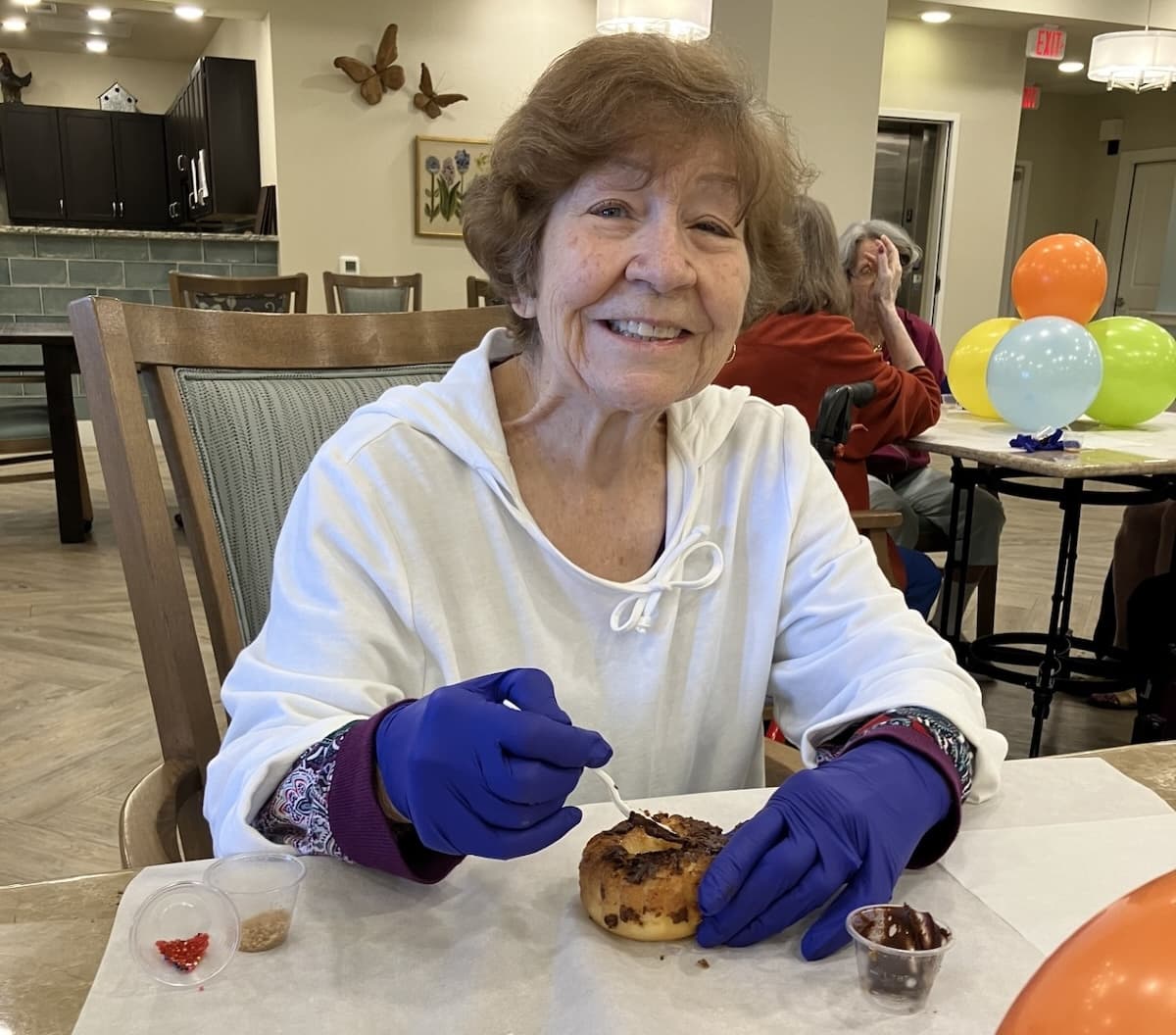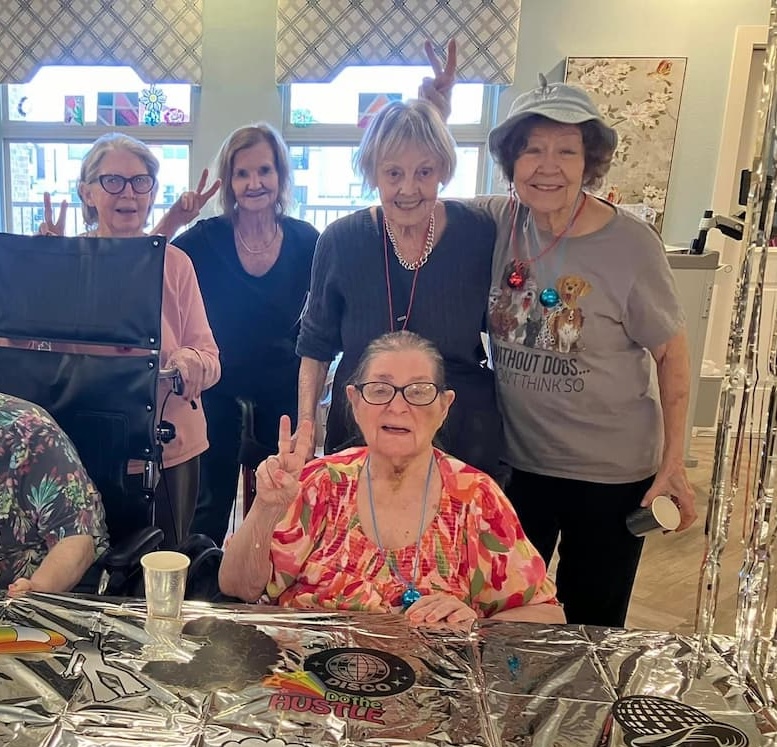Alzheimer’s causes memory loss and cognitive decline, while Parkinson’s affects movement and coordination due to brain cell damage. Both profoundly impact seniors’ daily lives, and there is no definable cure. While there’s no way to prevent Alzheimer’s and dementia, we can mitigate the symptoms OR reduce the risk of Alzheimer’s/dementia.

Buda Oaks provides assisted living and memory care services to seniors in Buda, TX, just outside Austin. We support residents with Parkinson’s, Alzheimer’s, and other forms of dementia following the need for assisted living. We specialize in personalized care for these residents, with therapies, structured routines, and activities that support cognitive and physical functions.
Parkinson’s can lead to dementia in later stages, with memory loss, confusion, and impaired judgment, impacting overall cognitive function. We understand how people worry about developing these conditions and their concerns for loved ones.
10 Ways to Minimize the Risk of Memory Loss
1. Quit Smoking
We tend to think of tobacco use as a vice that damages the heart and lungs, but it also directly affects the brain. One study discovered smokers were 30 percent more likely to develop a form of dementia.
The power of nicotine adversely affects dopamine levels, which can lead to anxiety and depression. Low levels of dopamine could significantly increase your chances of Alzheimer’s, says recent research.
Here are five tips that can help people give up the habit:
- Set a quit date and stick to it.
- Find support from friends, family, or a support group.
- Identify triggers and develop strategies to cope without smoking.
- Consider nicotine replacement therapy or other cessation aids.
- Stay positive and reward yourself for progress, focusing on the health benefits of quitting.
2. Mindful Eating: Healthier Diet and Nutrition
Adopting a healthy Parkinson’s diet makes sense since this condition can lead to dementia. You probably know that fruits, vegetables, salmon, and nuts are brain-healthy. Some think they reduce tremors. Here are foods to avoid with Parkinson’s and Alzheimer’s:
- Dairy products: Regular consumption of specific dairy items has been linked to a higher likelihood of developing Parkinson’s disease.
- Red meat: Limit saturated fats. Healthier foods include beans, lean poultry, and cold-water fish for protein.
- Trans fats: These fats, high in elaidic acid, can increase the risk of dementia by 50-70 percent.
- Fried foods: Some forms of dementia are vascular-related. The inflammation the body experiences when eating fried foods can damage the blood vessels that supply the brain.
- White bread: Intake of refined carbohydrates can cause side effects like blood sugar spikes and crashes, releasing toxins in the brain.
- Excess alcohol: A single beer or glass of wine a day may be okay, but more can increase the risk of developing brain damage.
- Sugary drinks and artificial sweeteners: High fructose levels may shrink certain sections of the brain. Diet soda drinkers were three times more likely to experience a stroke or dementia.
- Processed foods like meats and cheeses: Packaged foods and bacon can contain harmful proteins and toxins for the brain that can make symptoms worse.
3. Keep the Rhythm
Heart health is crucial for overall well-being and brain health, impacting longevity and quality of life. There are proven ways to reduce your risk of cardiovascular diseases caused by high blood pressure and diabetes.
Your brain will thank you for:
- Engaging in regular exercise, aiming for at least 150 minutes per week
- Maintaining a balanced diet rich in fruits, vegetables, lean proteins, and whole grains
- Limiting intake of saturated fats and processed foods
- Managing stress levels through relaxation techniques
- Quitting smoking and limiting alcohol intake
- Regularly monitoring blood pressure and cholesterol levels
- Seeing your cardiologist regularly
4. Protect Yourself
Safety precautions prevent accidents and injuries, which can have severe consequences for age-related vulnerabilities.
- Install grab bars and non-slip mats in bathrooms
- Ensure proper lighting indoors and outdoors
- Remove tripping hazards
- Regularly review medications
- Stay active to maintain strength and balance
- Have emergency contacts readily available
- Wear proper protective gear for physical activities, like riding a bike, skiing, or skating
- Wear your seatbelt in the car
- Remember your flu shots and other vaccinations; they might reduce your risk of Alzheimer’s by 17 percent
5. Get Good Sleep
Getting a good night’s sleep is a great way to build memory-making patterns. Quality sleep plays a crucial role in preventing memory loss. It promotes the consolidation of memories and clears toxins from the brain.
Tips for better sleep include:
- Maintain a consistent sleep schedule
- Create a relaxing bedtime routine
- Optimize sleep environment (cool, dark, and quiet)
- Limit screen time before bed
- Avoid caffeine and heavy meals late in the day
- Engage in regular physical activity
6. Keep It Moving
Breaking a sweat and raising your heart rate for about 150 minutes a week can help prevent Alzheimer’s. If 150 minutes sounds like a lot, break it into three sets of ten-minute activities five days a week.
Living with Parkinson’s or Alzheimer’s does not necessitate a sedentary lifestyle. Our residents participate in daily activities geared toward their capabilities.
- Walking: Walking is a low-impact exercise that can be done indoors or outdoors. Start with short walks and gradually increase duration.
- Chair Yoga: Gentle yoga poses are done while seated or using a chair for support.
- Tai Chi: Slow, flowing movements improve balance, flexibility, and muscle strength.
- Resistance Band Exercises: Lightweight and portable resistance bands offer gentle strength training.
7. Learning Is For Life
Although researchers haven’t definitively learned how to prevent Alzheimer’s, they recognize the importance of keeping an open mind. Like the body, working out the brain is a good defense against memory loss. A study challenged people between 60 and 90 to learn new things. The results showed that the people who accomplished this experienced higher levels of memory function.
- Learning a Musical Instrument: Trying a new instrument challenges the brain and enhances coordination.
- Mastering a New Language: Studying a foreign language stimulates cognitive function, improves memory, and enhances communication skills.
- Exploring Digital Technology: Embracing technology like smartphones, tablets, or computers opens up exciting possibilities.
- Creative Writing: Creative writing exercises or joining a memoir-writing class encourages self-expression, stimulates imagination, and preserves memories for future generations.
- Gardening: Cultivating a garden or flowers offers physical activity, sensory stimulation, and opportunities for lifelong learning.
8. Spend Time With Family
Spending time with family, fostering emotional bonds, and reducing feelings of loneliness or isolation benefit seniors significantly. Creative ideas include hosting family game nights, cooking or baking, and attending cultural events or concerts. These activities promote connection, laughter, and cherished memories for seniors and their loved ones.
Don’t wait for family members to invite you to come out; ask for a visit instead. Buda Oaks encourages residents to invite loved ones to our community. Here, they spend quality time at family meals or special events for all ages. We have a blast!
9. Keep Up On The Gossip
Maintaining social relationships with peers helps seniors experience a higher quality of life. Senior isolation and loneliness can be as detrimental to health as smoking, obesity, and inactivity. It also raises the risk of dementia by 50 percent.
Regular interactions with friends and family are wonderful, but seniors also enjoy hanging out with people in their age range. Whether it’s relaxing in a lounge with coffee, taking a day trip to a nearby lake, or watching a movie, the benefits of socialization are immeasurable. Consider volunteering with a cause close to your heart or joining meet-up groups for hobbies you enjoy.
10. You Are Not Alone
Thankfully, we’ve seen a decline in the stigma surrounding the discussion of mental health. Depression, anxiety, and stress are all linked to higher chances of dementia. Forty percent of people living with Alzheimer’s also experience depression.
If you are experiencing problems with your mental health, reach out to resources near you:
- Alzheimer’s Association: This organization provides support, resources, and education for individuals living with Alzheimer’s and their caregivers.
- National Institute on Aging: Offers information on healthy aging, Alzheimer’s disease, and related dementias.
- Mental Health America: Provides screening tools, resources, and support for mental health concerns.
- Parkinson’s Foundation: Provides educational materials, support groups, and research funding.
- Michael J. Fox Foundation: Funds research, offers educational resources, and advocates for Parkinson’s patients.
Does senior living at Buda Oaks provide ways of protecting brain health?
Some day, there may be answers about how to prevent Alzheimer’s and dementia. For now, our compassionate caregivers employ targeted techniques every day by promoting active assisted living and engaging memory care. Both programs help with activities of daily living while removing the burdens of household chores from one’s life. Our culinary team provides three nutritious meals daily, and we have a calendar of daily social, physical, and mentally stimulating activities.
Families trust The Retreat at Buda Oaks, our calm, secure memory care neighborhood. We provide an environment that inspires and honors loved ones experiencing Alzheimer’s and other forms of dementia. Our specialized memory care programming uses a holistic approach to impeding the memory loss process.
Discover How Assisted Living in Buda, TX, Can Benefit Your Life
Contact Buda Oaks for more information on assisted living and memory care. We would be happy to arrange a tour of our community just for you.
*This article should not replace medical advice. Talk with your doctor regarding any issues you may experience, especially if you suspect memory loss, dementia, or Parkinson’s.

